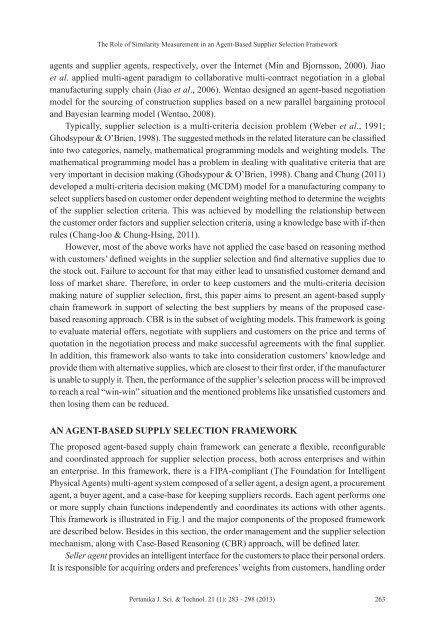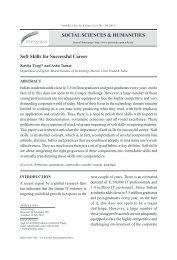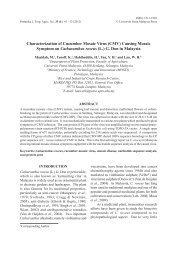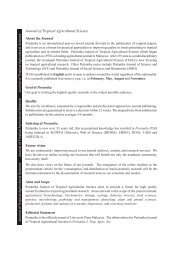JST Vol. 21 (1) Jan. 2013 - Pertanika Journal - Universiti Putra ...
JST Vol. 21 (1) Jan. 2013 - Pertanika Journal - Universiti Putra ...
JST Vol. 21 (1) Jan. 2013 - Pertanika Journal - Universiti Putra ...
You also want an ePaper? Increase the reach of your titles
YUMPU automatically turns print PDFs into web optimized ePapers that Google loves.
The Role of Similarity Measurement in an Agent-Based Supplier Selection Framework<br />
agents and supplier agents, respectively, over the Internet (Min and Bjornsson, 2000). Jiao<br />
et al. applied multi-agent paradigm to collaborative multi-contract negotiation in a global<br />
manufacturing supply chain (Jiao et al., 2006). Wentao designed an agent-based negotiation<br />
model for the sourcing of construction supplies based on a new parallel bargaining protocol<br />
and Bayesian learning model (Wentao, 2008).<br />
Typically, supplier selection is a multi-criteria decision problem (Weber et al., 1991;<br />
Ghodsypour & O’Brien, 1998). The suggested methods in the related literature can be classified<br />
into two categories, namely, mathematical programming models and weighting models. The<br />
mathematical programming model has a problem in dealing with qualitative criteria that are<br />
very important in decision making (Ghodsypour & O’Brien, 1998). Chang and Chung (2011)<br />
developed a multi-criteria decision making (MCDM) model for a manufacturing company to<br />
select suppliers based on customer order dependent weighting method to determine the weights<br />
of the supplier selection criteria. This was achieved by modelling the relationship between<br />
the customer order factors and supplier selection criteria, using a knowledge base with if-then<br />
rules (Chang-Joo & Chung-Hsing, 2011).<br />
However, most of the above works have not applied the case based on reasoning method<br />
with customers’ defined weights in the supplier selection and find alternative supplies due to<br />
the stock out. Failure to account for that may either lead to unsatisfied customer demand and<br />
loss of market share. Therefore, in order to keep customers and the multi-criteria decision<br />
making nature of supplier selection, first, this paper aims to present an agent-based supply<br />
chain framework in support of selecting the best suppliers by means of the proposed casebased<br />
reasoning approach. CBR is in the subset of weighting models. This framework is going<br />
to evaluate material offers, negotiate with suppliers and customers on the price and terms of<br />
quotation in the negotiation process and make successful agreements with the final supplier.<br />
In addition, this framework also wants to take into consideration customers’ knowledge and<br />
provide them with alternative supplies, which are closest to their first order, if the manufacturer<br />
is unable to supply it. Then, the performance of the supplier’s selection process will be improved<br />
to reach a real “win-win” situation and the mentioned problems like unsatisfied customers and<br />
then losing them can be reduced.<br />
AN AGENT-BASED SUPPLY SELECTION FRAMEWORK<br />
The proposed agent-based supply chain framework can generate a flexible, reconfigurable<br />
and coordinated approach for supplier selection process, both across enterprises and within<br />
an enterprise. In this framework, there is a FIPA-compliant (The Foundation for Intelligent<br />
Physical Agents) multi-agent system composed of a seller agent, a design agent, a procurement<br />
agent, a buyer agent, and a case-base for keeping suppliers records. Each agent performs one<br />
or more supply chain functions independently and coordinates its actions with other agents.<br />
This framework is illustrated in Fig.1 and the major components of the proposed framework<br />
are described below. Besides in this section, the order management and the supplier selection<br />
mechanism, along with Case-Based Reasoning (CBR) approach, will be defined later.<br />
Seller agent provides an intelligent interface for the customers to place their personal orders.<br />
It is responsible for acquiring orders and preferences’ weights from customers, handling order<br />
<strong>Pertanika</strong> J. Sci. & Technol. <strong>21</strong> (1): 283 - 298 (<strong>2013</strong>)<br />
263





